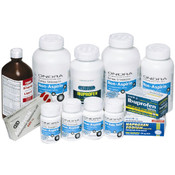Bipolar disorder is a complex psychiatric disorder and is considered to be an important cause of worldwide disability. Mood stabilizers are the primary pharmacological intervention, both in the treatment of acute episodes and in prophylaxis.
There is, however, mounting evidence that dietary supplementation with omega-3 fatty acids may be beneficial in psychiatric conditions, particularly those involving disturbances of mood.
A recent review of almost 100 medical studies examining the current level of evidence regarding the efficacy of omega-3 fatty acid supplementation in improving bipolar disorder symptoms by researchers of the Columbia School of Nursing in New York, shows that omega-3 fatty acids in addition to prescribed medication, may benefit patients.
The reviewers identified seven relevant studies including 230 patients diagnosed with bipolar disorder who received, in addition to their prescribed medication, omega-3 fatty acid supplementation for between 4 and 52 weeks. Based on the outcome of these studies, they researchers concluded that supplementation was effective in more than half of the selected studies, demonstrating a statistically significant improvement in bipolar disorder symptoms.
The review conducted by Teresa Turnbull and colleagues and was published in the October 2008 issue of the Archives of Psychiatric Nursing (Arch Psychiatr Nurs 2008; 22: 305-311).
EPA and DHA
The researchers confirmed that patients using an omega-3 combination of eicosapentaenoic acid (EPA) and docosahexanoic acid (DHA) demonstrated a statistically significant improvement in bipolar symptoms, whereas those using a single component of either EPA or DHA did not.
Benefit explained
The effects of omega-3 fatty acid supplementation can be explained by the fact that omega-3 fatty acids exert an inhibitory effect on the cell signaling pathway which is thought to be very similar to the mechanism of action of commonly prescribed mood stabilizers.
Patient adherence
Adherence to treatment can be a challenge for any patient diagnosed with a chronic disease requiring daily medication. This is not different for patients taking mood stabilizers. Side effects may often lead to patients discontinuing their medication, leading to inadequate medication.and treatment failures. ‘The question that researchers of omega-3 and bipolar disease are asking is whether supplementation with omega-3 can support the effect of prescription mood stabilizers in symptom reduction, which may, in turn, reduce dosing requirements, untoward side effects, and nonadherence,’ the researchers write in the October issue of Archives.
Improvement with omega-3 fatty acids
In reviewing the available data, the researchers identified that most patients diagnosed with bipolar disease continued their usual treatment, which included psychotropic medication, psychological therapy, or both. Overall, they reported that four of the seven studies showed a statistically significant improvement with omega-3 fatty acids supplementation in bipolar symptoms using screening tools and rating scales measure mental health symptoms. These scales include Young Mania Rating Scale, Hamilton Rating Scale for Depression, Clinical Global Impression Scale, and the Inventory of Depressive Symptomatology.
In conclusion, the researchers comment that ‘Due to its benign side effect profile and some evidence supporting its usefulness in bipolar illness, … omega-3 supplementation… may be a helpful adjunct in the treatment of selected patients.’
More study required
A different systematic Cochrane database review, studying the efficacy of omega-3 fatty acids as either a monotherapy or an adjunctive treatment for bipolar disorder by Montgomery and Richardson of the, Centre for Evidence-Based Intervention of the University of Oxford, also concluded that various studies confirm positive effects of omega-3 fatty acids as an adjunctive treatment for depressive but not manic symptoms in bipolar disorder.
But Montgomery and Richardson believe that these findings must be regarded with caution owing to the limited data available and that, in the treatment of bipolar disorder [the current results] are insufficient for us to draw definite conclusions that can guide clinical practice’.
In their conclusion, they confirm that although omega-3 fatty acids may be beneficial, there is an acute need for well-designed and executed randomized controlled trials.
For more information about Omega-3 fatty acids, visit Vitaelin Nutraceuticals at http://vitaelinhealthcenter.com.
Sources
- Turnbull T, Cullen-Drill M, Smaldone A. Efficacy of omega-3 fatty acid supplementation on improvement of bipolar symptoms: a systematic review. Arch Psychiatr Nurs. 2008 Oct;22(5):305-11.
- Montgomery P, Richardson AJ. Omega-3 fatty acids for bipolar disorder. Cochrane Database Syst Rev. 2008 Apr 16;(2):CD005169.







No comments:
Post a Comment